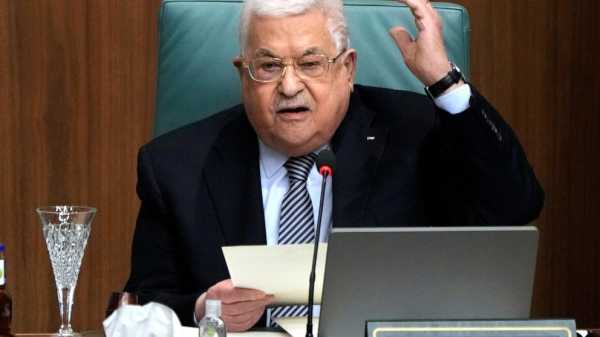
RAMALLAH, West Bank — Palestinian President Mahmoud Abbas fired most of the governors in the occupied West Bank on Thursday, responding to long-standing demands for a political shake-up as frustration grows with the semi-autonomous Palestinian Authority.
Abbas issued a decree dismissing the governors of eight provinces under Palestinian administration in the occupied territory. The upheaval included the restive northern cities of Nablus, Jenin and Tulkarem, the focus of a recent surge in Palestinian militancy that has undermined the authority’s leadership. Only three areas — including Ramallah, the seat of the Palestinian Authority — retained their governors. The president’s office said that he would form a committee to suggest replacements.
Although the decision is unlikely to have an immediate impact on the ground, experts said it signals Abbas’ recognition of the authority’s deepening unpopularity and his desire to show that he is heeding calls for change in the face of mounting difficulties.
"It gives the authority a new face, which is important particularly as the governors are in charge of all security matters,” said political analyst Jehad Harb. “But it won’t change anything really. (Abbas) is trying to rebuild some public trust, but it will take much more.”
Palestinians have not had the chance to vote in national elections since 2006. Abbas’ original four-year term technically ended in 2009.
Although governors said they had expected an overhaul for years given growing demands for change, many said Thursday’s decree took them by surprise. Yet none expressed dissent with the decision of the president, who rule has become increasingly autocratic in the past years.
"I can understand how fresh blood is important,” said Jihad Abu al-Assal, the governor of Jericho and the Jordan Valley. “This is the president’s decisions and even if we don’t understand all the reasons for it, we will comply.”
The move comes as the secular nationalist Fatah party, which runs the internationally recognized Palestinian Authority, grapples with mounting crises — internal and otherwise.
Israeli Prime Minister Benjamin Netanyahu’s far-right government has imposed numerous sanctions on the authority, expanded settlements on lands Palestinians seek for a future state and overseen Israeli military raids into West Bank cities that Palestinian officials say weaken their control. Powerful ministers in the government have openly called for the collapse of the authority and the annexation of the West Bank. These policies have been accompanied by a surge in vigilante settler violence against Palestinians.
Internal tensions have escalated since 2021, when Abbas delayed Palestinian legislative elections in which Fatah was expected to suffer another embarrassing defeat to the Hamas militant group. Hamas wrested control of the Gaza Strip in 2007 — a year after winning Palestinian parliamentary elections.
Over the past two years, surging violence in the occupied West Bank has added to the authority’s troubles. The recently emerging ties between Fatah activists and Islamic militant groups — particularly in flashpoint cities such as Jenin and Nablus — have rattled the security establishment and underscored internal divisions.
Given that the authority maintains security coordination with Israel, Palestinians increasingly see it less as a government than a vehicle for corruption and collaboration. Public services have declined as strikes for better pay among teachers, lawyers and other civil servants cripple key sectors.
Abbas’ decree also fired four governors in the Gaza Strip, whose role has remained symbolic since the 2007 Hamas takeover of the enclave.
Sourse: abcnews.go.com






